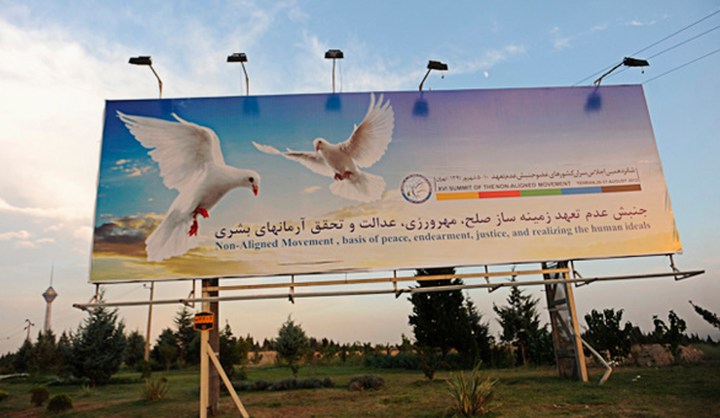Newsdeck
Iran brings new direction to Non-Aligned Movement

The summit of the Non-Aligned Movement in Tehran this week carries benefits for the host country beyond its counter-sanctions strategy. Less obviously, and linked to its goal to take a greater international role, Iran's three-year presidency of the organization will also bring gains for the NAM in helping it to return to its founding principles. By KAVEH L AFRASIABI (Asia Times Online).
Although much of the world’s media’s attention on this week’s summit of the Non-Aligned Movement (NAM) in Tehran has focused on how it benefits Iran and its counter-sanctions strategy, so far little attention has been paid to the related question of how the developing world’s global political movement benefits from Iran’s input, particularly now that Tehran has assumed NAM’s stewardship for the next three years.
The answer is relatively straightforward: Iran is helping NAM recapture its original political imagination, reflected in the 1955 founding Bandung summit’s 10 principles emphasising independence and solidaristic anti-hegemonic orientation, which is echoed by Iran’s “neither east, nor west” ideological expression that has been a hallmark of the post-revolutionary order in Iran.
This is in stark contrast to Egypt and Cuba, the past two NAM presidents. Egypt (under Hosni Mubarak) was clearly aligned with the West, while Cuba has long legacy of being a part of the eastern bloc during the Cold War.
The contrast with Iran’s complete harmony of its foreign policy orientation with the NAM norms and principles means that the movement has taken a healthy turn toward self-renewal, which in turn gives Tehran a good deal of latitude in shaping NAM’s next moves, for example at the United Nations, where NAM’s eyes are focused on meaningful UN reform, such as the expansion of the Security Council and enhancing the role of General Assembly.
Nearly 20 years ago, in my book After Khomeini: New Directions in Iran’s Foreign Policy, I articulated a theory of Iran’s foreign policy that was much indebted to the late French philosopher, Michel Foucault, and his specific concept of “cameralism” denoting a unique logic of evolution on the part of the Islamic Republic that dictated a greater and greater role as an “international actor”.
Revisiting the final chapter of that book, sub-titled “Iran as an international power”, may be instructive for a better insight into this week’s historic summit in Tehran and Iran’s new NAM presidency:
“Yet, inside Iran there persists the belief that Iran by virtue of its old civilisation or the dynamism of its religious ideology, has been destined to play a crucial role in reshaping global politics … the Cold War’s end has helped Iran project power beyond its immediate region and acquire a semblance of influence in international affairs…
“Iran has been building up its network of international solidarity, and its ideological appeal has picked up momentum instead of waning … For Iran there is little room to compromise this identity because of the fusing of foreign and domestic issues. Almost all of the country’s identity pivots around the definition of its special place in Muslim international politics.
“The founding of the Islamic Republic was attacked to the realm, in Husserl’s term, of a “world constituting subjectivity” that bespoke of Iran’s emergence as an international power of a different kind, ie, as a “moral superpower”… the regime’s Third Worldist concerns with “underdevelopment,” North-South relations, anti-imperialism, and so on, have remained virtually unchanged today, although the perception of the method of dealing with those problems has changed dramatically …
“Overall, the newness in Iran’s Third World strategy consists of a fresh rethinking of the entire problematic of domination and resistance on the world level. Iran’s new penchant for a Third-World struggle from inside the IOs (international organisations) resonates with Krasner’s insight that ‘Third World states have been able to change, to some degree, all regimes to which they had access, or in which their sovereignty could be used effectively … In this connection, charting a new path for NAM requires a great deal of sensitivity by the Iranian foreign policy leaders to the logic of Third World diversity and to the limits of their Third World strategy.’”
In retrospect, I would not be inclined to make any changes in that book’s narrative that, at least with respect to the particular issue of NAM and the requirements of Third Worldist politics, has withstood the test of time. Of course, the nature of problems confronting NAM has undergone some significant changes, while remaining rather constant with respect to the traditional problems of big power domination and underdevelopment.
Perhaps even India has realised this important point, which may explain New Delhi’s high level of participation, along with the largest delegation to the summit, a timely turnaround from the bombastic post-NAM discourses in India recently that questioned the organisation’s relevance to an India that has risen to the prominence of an “advanced” industrial country.
But, the recent extensive blackouts in India, affecting half the population, have been a sore reminder that the country still has a long way to go and, as a corollary, should return to its initial NAM elan, as championed by Jawaharlal Nehru some half a century ago. Hence, in a certain sense, we are witnessing India’s “big return” to NAM, which, along with Iran’s presidency, is a good omen for the movement’s immediate future. DM
Credit: This edited article is used courtesy of Asia Times Online, who retain copyright.
Photo: A billboard of the Non-Aligned Movement Summit is seen in Tehran, as the city hosts the 16th summit of the Non-Aligned Movement in Iran, August, 29, 2012. REUTERS/Amir Kholousi/ISNA/Handout




















 Become an Insider
Become an Insider